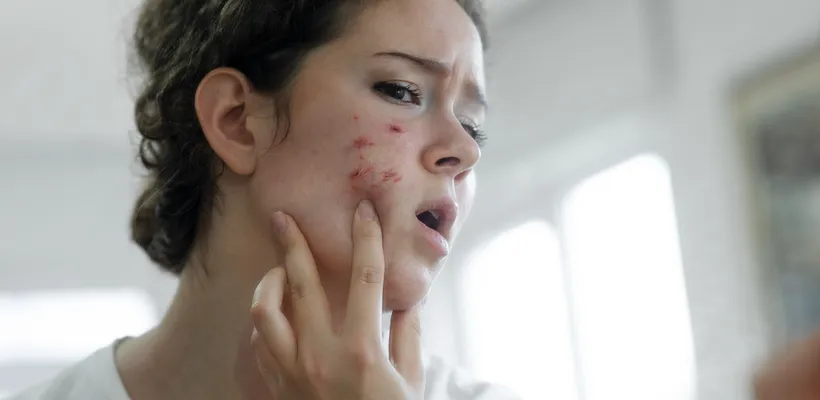What Causes Acne?

Acne is a skin condition that arises when hair follicles become clogged with oil and dead skin cells. This condition is most commonly observed among teenagers due to hormonal changes, but it can also affect individuals of all age groups, including adults and even infants. While acne typically resolves over time, it can be a significant source of stress for those who experience it, often leading to diminished self-esteem and confidence.
But what exactly causes acne? In our comprehensive article, we’ll explore the various forms acne can take, delve into the underlying reasons for its development, and dispel some widely held myths and misconceptions about this condition.
Symptoms of Acne
Acne will usually appear on the face, chest, forehead, upper body, and shoulders, as these areas of skin have the most oil glands.
The severity can vary, and can come out in the following symptoms:
Whiteheads
If the plugged follicle is close to the surface of the skin, it bulges outwards, which creates a whitehead.
Blackheads
The plugged follicle can also be open to the skin, which creates a blackhead.
Inflammatory Lesions
Harmless bacteria that live on the skin can contaminate and infect the plugged follicles, which can cause papules, pustules, nodules, or cysts. This type of acne is more likely to cause scarring.
Papules
Papules are small, red, raised bumps that are caused by inflamed or infected hair follicles.
Pustules
Pustules are small red pimples that have pus at their tips.
Nodules
Nodules are solid lumps that develop beneath the surface of your skin, and they can often be painful.
Cysts
Cysts are large lumps beneath your skin that contain pus and are usually painful.
Main Causes of Acne
Genetics
Acne can run in families, so if your parents had acne, you could also develop it. Studies have found that if both your parents had acne, you're more likely to get acne at an early age, and if both parents had adult acne, you're more likely to develop adult acne.
Testosterone
Acne in teenagers can be caused by increased levels of testosterone, which occurs during puberty. The sebaceous glands are sensitive to hormones, so it's thought that increased levels of testosterone cause glands to produce too much sebum.
Certain Medications
Medications containing ingredients like lithium (which is used to treat depression and bipolar disorder), as well as steroid medicines and some drugs used to treat epilepsy, have also been known to contribute to acne.
Changes in Hormone Levels
Women are more likely to have adult acne than men, and it's thought that this is caused by changes in hormone levels at certain times. These times include during periods, pregnancy, and if a woman has polycystic ovary syndrome.
Smoking
Smoking can affect a lot of your body's organ systems, including your skin. It has been linked to causing or making acne worse in older people.
Acne Myths
Although acne is a widespread skin condition affecting many individuals, there remain numerous misconceptions and misunderstandings about its causes and effects.
These factors, for example, have been found to have minimal or no influence on the development of acne:
Chocolate and greasy food - despite popular belief, there is currently no scientific evidence to support the idea that consuming specific foods directly causes acne. Nevertheless, it is advisable to maintain a balanced and nutritious diet to support your overall health and well-being.
Poor hygiene - many of the primary triggers for acne originate beneath the skin's surface rather than on it. In fact, excessive washing of your face, more than twice daily, can potentially irritate your skin and exacerbate acne symptoms.
Cosmetic products - most modern cosmetic products undergo testing to ensure they do not contribute to the formation of spots. These products are often labeled as non-comedogenic, meaning they are formulated to not block pores.
Treatments for Acne
Acne treatment has become increasingly more prevalent, with various gels and creams available that contain benzoyl peroxide. Here at Weldricks Pharmacy, we offer a wide range of brands, so you can be sure to get the best treatment on the market.
Browse our relevant products:
Acne often doesn't have longer-term implications, however, it can result in scarring in more extreme cases. In these instances, more aggressive treatments may be required. Read more on how to get rid of acne scars.
When to See a Doctor
You shouldn't squeeze your blackheads, whiteheads, or spots, as this could actually make symptoms worse and may leave you with scarring. If self-care remedies don't clear your acne, you can book an appointment with your doctor, who can then prescribe stronger medications for you to try.
If acne persists or is very severe, you might want to seek treatment from a specialist, such as a dermatologist or paediatric dermatologist.
It’s important to be aware that some non-prescription acne lotions can occasionally cause reactions. This type of reaction is quite rare, so it shouldn't be confused with redness or itchiness that may occur in areas where you've applied products. You should seek emergency medical help if after using a skin product you experience:
-
Faintness
-
Difficulty Breathing
-
Swelling of the eyes, face, lips, or tongue
-
Tightness of the throat
Browse our Range of Skincare Products
We’ve discussed what causes acne, and the best treatments you can use to try and tackle it. Some causes are unavoidable, and the acne will usually go away on its own over time. However, in some cases, the acne can persist, and you may wish to seek specialist advice.
We offer acne skin care, acne treatments, acne medication, as well as gels and lotions to help you combat your acne and prevent scarring. We also offer a range of other skincare products such as moisturising lotions, facial wipes, and night creams.